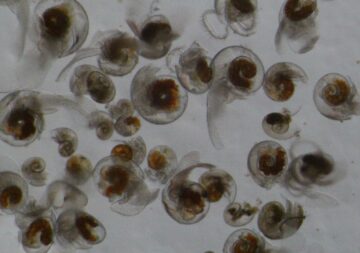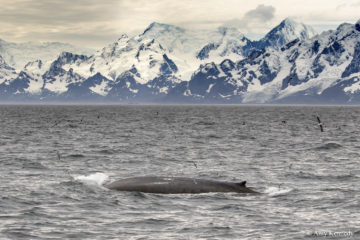Education

The ground beneath Antarctica’s most vulnerable glacier has been mapped for the first time, helping scientists to better understand how it is being affected by climate change. Analysis of the … The post Ground beneath Thwaites Glacier mapped for first time appeared first on British Antarctic Survey.

Chloe receiving her award, courtesy Cambridge Hub Wednesday, May 17, 2023 PhD student Chloe Balhatchet has been awarded the Vice-Chancellor’s Social Impact Award in Sustainability. Chloe, who is in the second year of her PhD, uses NMR to find and investigate new materials for supercapacitors, which will play a critical role in the transition to…

Climate change is an increasingly pervasive threat to global biodiversity. Animal populations in the rapidly changing Arctic are often seen as a litmus test for the response of wildlife to … The post AI for smart conservation appeared first on British Antarctic Survey.
The artificial leaf can produce liquid multi-carbon fuels using sunlight Thursday, May 18, 2023 Researchers from the Reisner group have developed a solar-powered technology that converts carbon dioxide and water into liquid fuels that can be added directly to a car’s engine as drop-in fuel. The researchers used artificial photosynthesis to convert CO2, water and…

Shelled pteropods, commonly known as sea butterflies, are increasingly exposed to ocean changes, but some species are more vulnerable to this threat. In a new study, published this month (11 … The post Sea butterfly life cycle threatened by climate change appeared first on British Antarctic Survey.
The post Contrasting life cycles of Southern Ocean pteropods alter their vulnerability to climate change appeared first on British Antarctic Survey.
In this article originally published in The Conversation, GDAR scientists Dr Gabriel Okello, and Dr Meelan Thondoo discuss strategies that individuals, communities and policy makers can adopt to reduce the threat posed by air pollution in African cities. Rapid urbanisation in Africa is worsening air pollution levels. There are economic as well as health consequences….
The post The role of the Southern Ocean in the global climate response to carbon emissions appeared first on British Antarctic Survey.
Shorthand Story: dAfQtUCV5C Shorthand Story Head: CEB-Alumni /* Source hash: 94e79fe0ecc42b896a524e84f346ba58 */ .InlineMedia a,.Theme-MediaSection .Theme-Layer-ResponsiveMedia-image>a{display:block;transition:opacity .15s ease}.Theme-LinkedMediaRenderer{display:block}.InlineMedia a:active,.InlineMedia a:focus,.InlineMedia a:hover,.Theme-LinkedMediaRenderer:active,.Theme-LinkedMediaRenderer:focus,.Theme-LinkedMediaRenderer:hover,.Theme-MediaSection .Theme-Layer-ResponsiveMedia-image>a:active,.Theme-MediaSection .Theme-Layer-ResponsiveMedia-image>a:focus,.Theme-MediaSection .Theme-Layer-ResponsiveMedia-image>a:hover{cursor:pointer;opacity:.9}.Theme-HeaderContainer{font-size:18px}.Theme-HeaderContainer,.Theme-Story{font-family:”Open Sans”,sans-serif;color:#212529;-webkit-font-smoothing:antialiased;-moz-osx-font-smoothing:grayscale}.Theme-HeaderContainer ::-moz-selection{color:inherit;background-color:rgba(160,160,160,.55)}.Theme-Story ::-moz-selection{background-color:rgba(160,160,160,.55)}.Theme-HeaderContainer ::selection{color:inherit}.Theme-HeaderContainer ::selection,.Theme-Story ::selection{background-color:rgba(160,160,160,.55)}@media (min-width:900px){.Theme-HeaderContainer,.Theme-Story{font-size:18px}}@media (min-width:1100px){.Theme-HeaderContainer,.Theme-Story{font-size:20px}}.Theme-HeaderContainer b,.Theme-HeaderContainer strong,.Theme-Story b,.Theme-Story strong{font-weight:700;color:inherit}.Theme-HeaderContainer p,.Theme-Story p{max-width:unset}.Theme-HeaderContainer p:empty,.Theme-Story p:empty{padding:0;margin:0}.Theme-HeaderContainer a:active,.Theme-HeaderContainer a:hover,.Theme-Story a:active,.Theme-Story a:hover{outline-width:0}.Theme-HeaderContainer img,.Theme-Story img{border-style:none}:root{–header-height:60px}.Layout{padding-left:0;padding-right:0}@media (min-width:1100px) and (max-width:1399px){.Layout{max-width:1240px}}@media (max-width:1400px){.Layout{width:auto}}.Layout__row{margin:0}@media (max-width:620px){.Theme-Layer-BodyText{width:100%}}.Theme-Column{padding-left:0;padding-right:0}.Theme-Layer-BodyText p,.Theme-Story p{display:block;margin-top:1.5rem;margin-bottom:1.5rem;line-height:1.7;font-family:”Open Sans”,sans-serif;font-weight:400;font-size:inherit}.Theme-Layer-TextBlock-Inner a:not(.Theme-Layer-BodyText-Button),.Theme-OverlayedCaption a,.Theme-Section-Dark…

Climate, biodiversity, and societal challenges are intrinsically linked and yet are usually viewed in isolation. A new review study, published in the journal Science this week (21st April 2023), focusses … The post Tackling climate change and biodiversity loss together appeared first on British Antarctic Survey.
